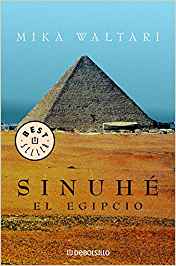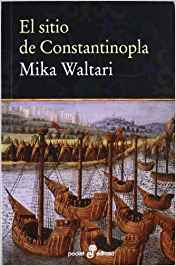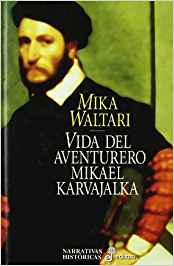Continuing with that intention of rescuing Nordic literature beyond the current eclipsing black genre (a matter that I already started with Norwegian Jostein Gaarder), we revisit today the figure of the emblematic Mika waltari. Pulling from the Finnish mythology of Waltari himself, something like the historian who came from ice.
Because from the ice of northern Europe, Waltari brought his literature to the calm waters of a Mediterranean made cradle of a western culture where Waltari found his plot background for his historical novels.
So Waltari, an author of great repercussion in his country and also in the continent as a whole, served that cause of miscellaneous narrative in which a writer as prolific as him joined in an interesting feed back.
A round-trip communication in which scholars from some latitudes write about distant environments of a Europe exuberant in cultural contrasts. Literature as a transversal cultural movement in which everything is shared by everyone from different perspectives, enriching and opening the readership.
But beyond the intention is the quality of the narrative, the narrative appeal itself. The most purist historical novel reader is always looking for new nuances, enriching details for which the writer must draw exhaustive documentation.
On the other hand, the more fictional reader of historical novels looks for interesting plots, tension and rhythm in the midst of more or less known historical events. In that balance lies the magic of triumph in this fiction genre. And Waltari knew how to approach both aspects towards an essential bibliography that in Spanish concentrates in twelve or fifteen novels of great flights.
Top 3 recommended books by Mika Waltari
Sinuhé, the Egyptian
For me, literature focused on the world of ancient Egypt always finds its cornerstone in that magical story of Jose Luis Sampedro: The old mermaid.
And the thing is that the reluctance is always there when it comes to undertaking an Alexandrian plot or around the Nile. But the prejudices are soon undone as we get into the character of Sinuhé.
In fact, the plot of this novel maintains great fidelity to the historical moment in which it happens at the same time as it connects with the oldest Egyptian mythology, from which the name of the protagonist appears, a doctor whose origins his own mother called him that by intuiting the beloved son that he could reach the value of the legend of that other Sinuhé who lived one of the greatest literary adventures for a culture so advanced that he was already capable of approaching the literary as entertainment.
The truth is that Sinuhé the doctor aimed high as a doctor of Akhenaten himself. But life was preparing a turn that would lead him to a harsh exile turned into a vital adventure towards deeper knowledge.
The Siege of Constantinople
When an author knows with absolute certainty and complete detail a historical event of the magnitude of the siege of Constantinople that would end the Byzantine Empire forever, any proposed fiction can be approached from the most suggestive recreation of aspects more typical of fictions that complete possible intra-histories.
Constantinople, the crucial point between East and West, the city that even today exudes incomparable authenticity with its slight concessions to globalization but still preserving that world around ancestral customs.
Visiting this place in the material or from the intangible of our imagination in a great novel like this is always a vital adventure. We place ourselves in 1453, when the Ottomans already made the city their own.
Giovanni Angelos becomes that character who leads us through the shadows of history, through that misty and magical feeling about the most human feeling in a world that seemed to be detached from a millenary era with the fall of the great city.
A love story and the feeling of occupying the essence of unforgettable characters from historical literature.
The life of the adventurer Mikael Karvajalka
With the appearance of a character almost an anagram of the author himself, we meet an adventurer whose Finnish origin ends up confirming the intention of planting an alter ego of Mika Waltari in one of his novels.
For this occasion, Mika presents us with a story that, although it may have less relevant historical background (since we go through different moments of great importance strung together more as an excuse or necessary ramifications), acquires greater brilliance in the foundation of a character with a quixotic in the middle of the XNUMXth century.
Mikael embarks on a magical adventure through a Europe that looks out to the New World and that begins to open up to new beliefs, political and commercial trends in a world ruled by the Spanish empire. In its changing settings, the novel acquires a very lively rhythm. A highly recommended novel to get started with the author or to get closer to the most entertaining historical novel.




2 comments on "3 best books by Mika Waltari"